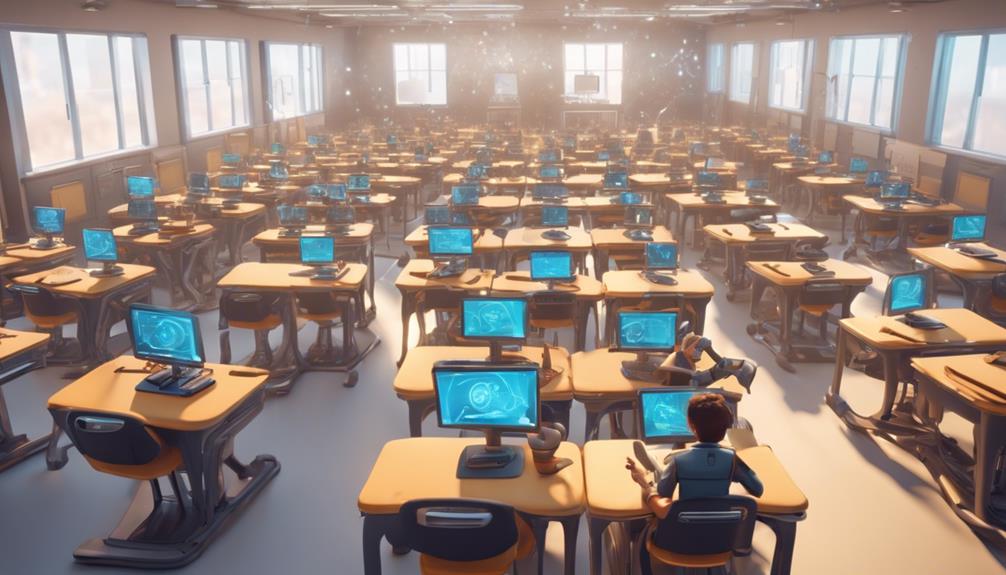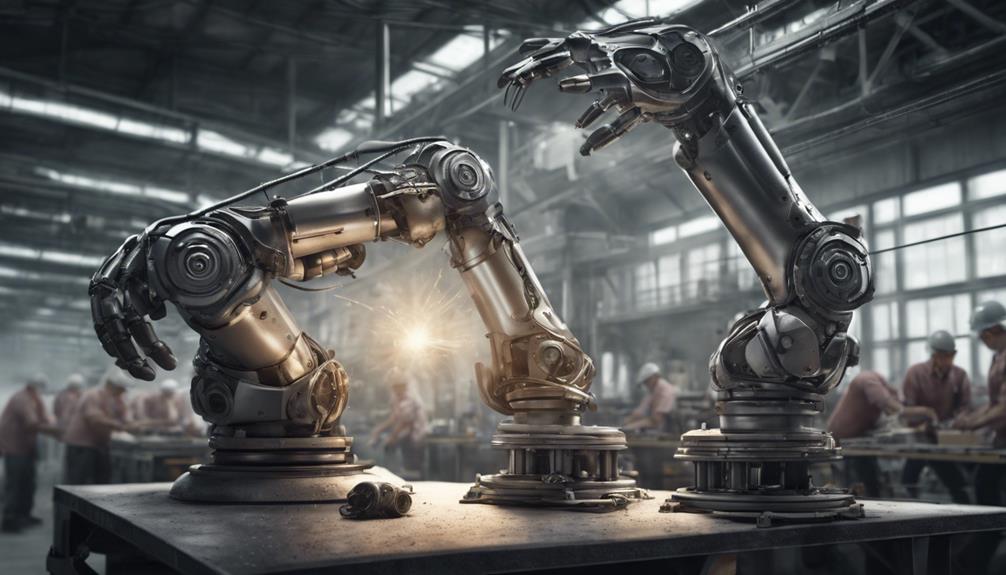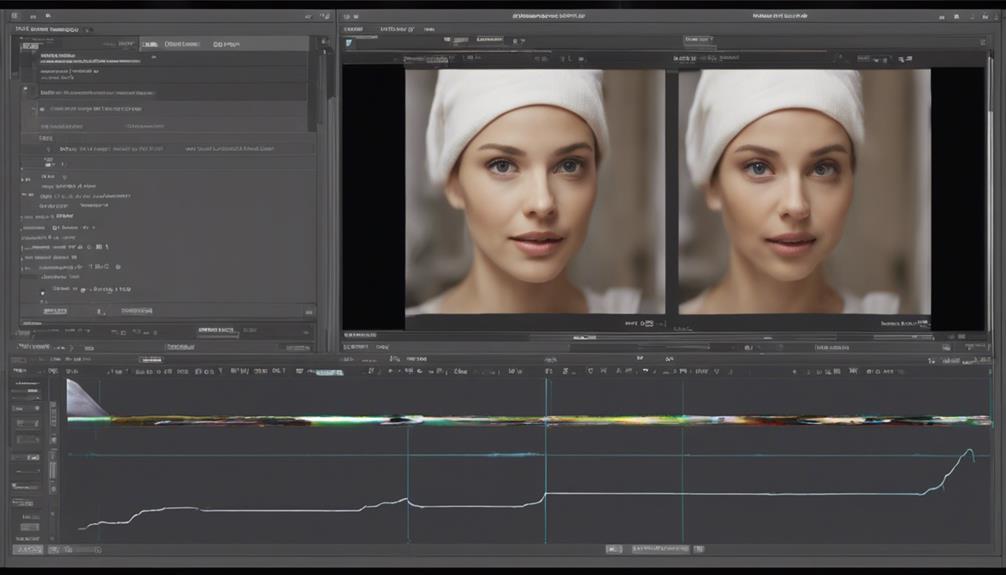Within the sphere of education, the incorporation of Artificial Intelligence (AI) has ignited discussions regarding its influence in transforming conventional instructional methods. With the ongoing progression of AI, its effect on educational environments and practices grows more profound.
From personalized learning experiences to automated assessments, AI offers a spectrum of possibilities that prompt reflection on the evolving landscape of education. However, as we ponder the extent to which AI replaces or complements human teachers, a crucial question emerges – what does the future hold for the intersection of AI and education?
Key Takeaways
- AI enhances teaching methodologies without replacing teachers.
- Teachers adapt to AI tools for personalized learning experiences.
- AI optimizes educational outcomes through data analysis.
- Balancing AI with personalized attention reshapes the role of teachers.
AI in the Classroom
In the realm of modern education, the integration of AI in the classroom revolutionizes teaching methodologies by offering personalized learning experiences tailored to individual student needs. Artificial intelligence (AI) tools, such as intelligent tutoring systems powered by Generative AI, can provide instant feedback and guidance on assignments for K-12 students. By analyzing vast amounts of data, AI can offer valuable insights into students' learning patterns, preferences, and areas for improvement. This level of personalized attention is challenging to achieve consistently for human teachers due to time constraints and varying class sizes.
Furthermore, AI's ability to adapt educational content to suit different learning styles and paces ensures that each student receives a customized learning experience. While AI aids teachers in providing tailored support, it does not aim to replace humans entirely. Instead, it complements teachers' efforts by automating administrative tasks, thereby saving time and effort. The incorporation of AI in classrooms ultimately seeks to enhance teaching efficiency and improve student outcomes by catering to individual learning needs more effectively.
Benefits of AI Integration

Leveraging artificial intelligence (AI) in educational settings yields a spectrum of benefits that revolutionize traditional teaching methods and enhance student learning experiences. One significant advantage is the ability of AI to provide personalized feedback to students promptly. This tailored guidance helps improve learning outcomes by addressing individual strengths and weaknesses.
Moreover, AI enables adaptive learning, catering to diverse learning styles and preferences, ensuring that each student receives customized support. By automating time-consuming administrative tasks like grading assignments, AI frees up educators to focus on high-value instructional activities.
Additionally, AI offers valuable insights by analyzing vast amounts of data to identify trends and patterns that can inform teaching strategies. Furthermore, AI plays a crucial role in bridging educational disparities by providing access to quality education in remote or underserved areas, ensuring that all students have the opportunity to learn and succeed.
Challenges Faced by Teachers
Amid the rapid advancements in educational technology, teachers encounter multifaceted challenges when navigating the integration of AI tools into their teaching practices. One significant challenge is finding the right balance between leveraging AI systems to assist in teaching and maintaining personalized attention for each student.
While AI can offer personalized learning experiences, human teachers worry about losing the essential human touch and relational aspects that are integral to effective teaching. Additionally, managing and integrating AI tools alongside traditional teaching methods can be overwhelming for educators, requiring them to undergo comprehensive training to effectively utilize these technologies while upholding their role as mentors.
The need for continuous professional development to stay abreast of AI advancements further adds to the challenges faced by teachers in the modern educational landscape. As the educational sector continues to evolve with AI integration, addressing these challenges is crucial to ensure that human teachers remain at the forefront of quality education delivery.
Implications for Future Education

Enhancing the educational landscape through the strategic integration of AI technologies requires a delicate balance between innovation and the preservation of human-centric teaching practices. AI, exemplified by platforms like Khan Academy, can assist educators by providing valuable insights into student learning patterns, enabling personalized learning experiences. While AI holds the potential to revolutionize education, its role should be viewed as a complement to teachers rather than a complete replacement. By leveraging AI tools such as ChatGPT and virtual tutors, teachers can enhance their teaching methodologies, focusing on nurturing critical thinking skills in students.
The ability of AI to process vast amounts of data offers educators new opportunities to tailor educational content to individual student needs. Collaborations between institutions like Khan Academy and OpenAI showcase the power of AI in optimizing educational outcomes. Moving forward, striking a harmonious balance between AI advancements and the irreplaceable human touch in teaching will be pivotal in shaping the future of education towards a more effective and personalized learning environment.
The Evolving Role of Teachers
As educators navigate the ever-changing landscape of education, the integration of AI tools and technologies is reshaping the traditional role of teachers towards a more dynamic and adaptive approach to fostering student learning. Teachers are no longer confined to mundane, repetitive tasks; instead, they are leveraging AI to provide customized learning experiences tailored to individual student needs.
By incorporating AI, teachers can create a new educational paradigm where students use technology to process vast amounts of information efficiently. This shift in the role of teachers has made impressive strides in enhancing student engagement and learning outcomes. Teachers now harness AI as a valuable resource to supplement their teaching strategies and help students overcome learning obstacles.
The evolving role of teachers involves embracing AI as a tool to revolutionize the educational experience, ultimately leading to a more personalized and effective learning environment for students seeking mastery.
Frequently Asked Questions
How AI Will Replace Teachers?
AI's evolving role in education includes personalized tutoring and enhancing student experiences. Research indicates AI can be more effective than conventional teaching methods in some scenarios. While concerns exist about decreased demand for human teachers, AI's impact continues to grow.
How Will Artificial Intelligence Affect Teachers?
Artificial intelligence will revolutionize teaching by automating tasks, offering personalized resources, and providing data-driven insights. While AI enhances teaching strategies, the human element of educators remains irreplaceable. The synergy between AI and teachers will redefine education.
Will Professors Be Replaced by Ai?
As AI technologies advance, the potential for AI to replace professors is a topic of discussion. While AI may supplement teaching, the intricate nature of human interaction, mentorship, and critical thinking skills suggests that a complete replacement is unlikely.
Will AI Replace K 12 Teachers?
As AI tools like ChatGPT gain popularity for homework help among K-12 students, concerns arise about their potential to reduce the demand for human teachers. The convenience and immediate responses of AI may reshape traditional education roles.
Conclusion
In conclusion, the integration of AI in education presents a transformative opportunity for enhancing learning experiences and preparing students for future success.
As educators navigate the evolving landscape of technology in the classroom, maintaining a balance between AI-driven efficiency and the human touch of teachers remains paramount.
By embracing innovation and adapting to the changing educational landscape, we can ensure that students receive the personalized guidance and critical thinking skills necessary to thrive in an increasingly AI-driven world.









